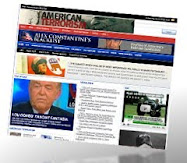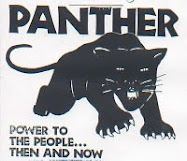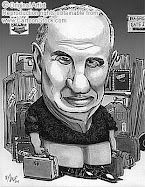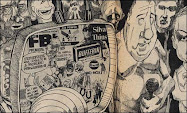Fled Mass. facility before extradition
By Bryan Bender
Boston Globe
July 17, 2009
The mystery has lingered for more than two decades, spawning conspiracy theories about the US government’s connection to one of Africa’s most brutal leaders: How did Charles G. Taylor escape from a Massachusetts county jail in 1985, setting him on the road to a bloody reign as Liberia’s president?
Taylor, on trial in The Hague for war crimes, broke his silence on the question this week, saying he was sprung from jail as part of a US intelligence operation.
On the night of Sept. 15, 1985, he recounted Wednesday, a guard unlocked his cell at the Plymouth County Correctional Facility - where he was awaiting extradition to Liberia on embezzlement charges - and escorted him to a less-secure unit of the jail. Taylor then tied sheets together, climbed out an open window, and clambered over a fence before meeting two men he assumed were US agents, who whisked him to New York by car.
"I am calling it my release be cause I didn’t break out," Taylor, 61, told his special war crimes court. "I did not pay any money. I did not know the guys who picked me up. I was not hiding" afterward.
The jail guard, he added, "had to be working with someone else."
Taylor’s story has not been verified, and it may only add to questions surrounding his disappearance. Some have theorized that the United States, through either the Central Intelligence Agency or the Defense Intelligence Agency, wanted to use Taylor to gather information in Africa, especially in Libya. Asked yesterday whether the CIA played any role in the jail break, agency spokeswoman Marie Harf said, "That’s absurd."
The agency later declined to say whether it had any relationship with Taylor, either before or after the escape. "We do not, as a rule, comment on these types of allegations," the statement said. A Defense Intelligence Agency spokesman did not have any immediate comment yesterday.
Prosecutors in his trial at The Hague had anticipated that Taylor would assert there was a US role in his escape in a bid to change the subject from his alleged crimes by implicating the United States in his path to power. Taylor, 61, has pleaded not guilty to 11 counts of war crimes and crimes against humanity.
He is accused of supporting rebels during neighboring Sierra Leone’s 1991-2002 civil war in which an estimated 500,000 people were killed, mutilated, or fell victim to other atrocities. He has insisted that the charges are lies and that he was trying to bring peace to the region.
But in an unusual defense, Taylor told judges yesterday that he saw nothing wrong with displaying the skulls of slain enemy soldiers at roadblocks.
Taylor arrived in the Boston area as a college student in 1972, where he studied economics at Chamberlayne Junior College and later at Bentley College (now University).
He returned to Liberia in the early 1980s, where he briefly worked in the government of President Samuel K. Doe before being accused of embezzling $900,000. He fled to Massachusetts in 1983. He was arrested in Somerville in 1984 and jailed in Plymouth pending extradition to Liberia.
His escape occurred days before a Taylor ally, Thomas Quiwonkpa, launched an unsuccessful military coup against Doe, a former US ally whose ethnic repression and corruption led Washington to cut off aid. Taylor told the war crimes court he was “100 percent positive’’ that the CIA was arming Quiwonkpa.
After the jail break, Taylor testified, he traveled freely in the United States and Mexico before returning to Africa from Mexico City. “My name was on my passport,’’ he said. “No one asked me any questions.’’
After returning to Africa, Taylor testified, he recruited 168 men and women for the National Patriotic Front for Liberia and trained them at a former US military base in Libya. His rebel force attacked Liberia in 1989, ultimately leading to the overthrow of Doe.
Four inmates who escaped with Taylor were recaptured within days.
To this day, the Plymouth County jail can’t say what really happened.
“We’re not in a position to say it’s not true,’’ John Birtwell, spokesman for the Plymouth County Correctional Facility, said yesterday. He said an investigation determined at the time there was no evidence that Taylor’s move was part of an escape plot.
“Through the haze of time it’s hard to know if it was deep black ops or [Taylor] saw an opportunity so he took it,’’ Birtwell said.
FBI’s Boston field office, for its part, said yesterday that the only possible evidence it has of the incident is a computerized record of a fugitive case opened on Taylor in October 1985. But Special Agent Gail Marcinkiewicz, an FBI spokeswoman, said the record indicated that no action was taken on it by the field office.
Asked whether there is a file on the case, she said, “I don’t know if the file exists.’’
A former senior war crimes investigator who dug into Taylor’s case said there may be some truth to the story.
“One person said the CIA had ultimately brought him down through Mexico City,’’ said Alan White, the former chief investigator for the special court who said he “had heard [the claims of a US role in the jail break] from some major informants I had.’’
White added: “How true it is I don’t know. I know the US government never wanted to talk about this whenever we brought it up.’’
White thinks it is plausible that the US government was most interested in Taylor at the time to gather intelligence on Libyan leader Moammar Khadafy, then accused of sponsoring terrorism against the United States.
Nevertheless, White and others said any cooperation back then has little bearing on the alleged crimes Taylor committed as president of Liberia more than a decade after he left the Boston area.
“This is not the first time we supported someone like this and found out later this was somebody that we should not have supported,’’ White said.
http://www.boston.com/news/world/europe/articles/2009/07/17/liberias_taylor_says_us_arranged_escape?mode=PF
skip to main |
skip to sidebar
"Advanced forms of biological warfare that can 'target' specific genotypes may transform biological warfare from the realm of terror to a politically useful tool." - PNAC, Rebuilding America's Defenses, p. 60
Psychic Dictatorship II
Mae Brussell
Blog Archive
-
▼
2009
(613)
-
▼
July
(69)
- DUBLIN'S DIRTY LITTLE SECRET
- Roseanne Barr in Hitler Drag: I Don't Even want to...
- The "Family": Lawmakers Part of Secret "Christian ...
- Report: Nonlethal Weapons Target Brain, Mimic Schi...
- The Corporate Roots of Auschwitz
- Vitter is for "Core Conservative Values"
- US Military to Set Up in Colombia
- German Police Seek Arrest of Far-Right Politician
- The Council of Conservative Citizens
- Book Review: Between Mussolini and Hitler: The Jew...
- The Neo-Nazis of Mongolia: Swastikas Against China
- Bastard Children of the RAND Corporation
- Fresno-Area Lawyer not Shy about Taking on the CIA
- The Nazi Monster Recruited by MI6 to Spy for Britain
- Apollo 11 Anniversary: "There could have been no m...
- Letter: How Sun Myung Moon Took Over the Universit...
- Count Adrian de Suiza worked for Spanish ruler Fra...
- Nazi Sympathizer David Irving Speaks in Downtown B...
- Flashback: Ex-Aide Calls CIA Under Casey and Gates...
- "America was the Source of the Cyber-Attack"
- Texas: Protesters Rally Over Dragging Death
- Berlusconi Says ‘I’m no Saint’ in Response to Tape...
- 300 Nazis Still Go Free in America
- Memorial Plaque for the Victims of IG Farben
- Mayo and Bolivia: The Fascist Link
- AG Eric Holder & Chiquita, Covington, Negroponte, ...
- VOICES: An Independent Corporate Front Group?
- CIA Officials Committed 'Fraud on the Court,' Judg...
- Parrish's Cult, Nazi Obsession Filled Home
- Democracy Hangs by a Thread in Honduras
- Bush's Key Men Face Grilling on Torture and Death ...
- Gonzales Dodges Question On Cheney and CIA
- Liberia’s Taylor says US Arranged Escape
- Fascism and Italian Football
- Washington & the Coup in Honduras: Here is the Evi...
- Bush Stymied Investigation of Massacre by CIA-Paid...
- Secret WWII Operation at “P.O. Box 1142” Bears Les...
- Two Cuban CIA Jackals Advised Honduras Coup
- HITLER'S FAVOURITE THUG
- Higher Ed and the Third Reich
- NEA General Counsel Complains of Attacks from "Rig...
- Imelda Marcos: The Best and Worst Life
- UK: Neo-Nazi 'Planned Terrorist Attacks'
- Post-9/11 Surveillance went Beyond Wiretapping
- Film Review: Il Divo, a Spectacular Film about Mob...
- UK: NEO-NAZIS PLAN TERROR ATTACK TO SPARK RACE WAR
- Democrats Say C.I.A. Deceived Congress for Years
- Calgary: Arms Business Growing Force
- Historian says US Backed “Efficacious Terror” in 1...
- James von Brunn, Pedro del Valle and the Fraternit...
- Obama Backs Keeping Cheney FBI Interview Secret
- New Orleans: Anarchism, Violence, and Brandon Darb...
- Honduras Coup General Was Charged in 1993 Auto The...
- Ellen G. White: Plagiarist, Spiritualist & Founder...
- Right-Wing Violence Is Very Real and Very Dangerous
- A Visit to Auschwitz: Reflections on Biology and t...
- Panthers: Nebraska Supreme Court Ignores COINTELPR...
- Eli Lilly ‘Ghostwrote’ Articles to Market Zyprexa,...
- Letter to the Editor: The Fascism in Futurism
- Early Days of Electronic Mind Control: Alfred Loom...
- Grand Jury Inquiry on Destruction of C.I.A. Tapes
- Ellen G. White, Founder of Seventh-Day Adventism
- New Jersey: ELEC Picks ex-GOP Operative as Execut...
- World Vision
- US Spy in Rendition Trial: 'I Followed Orders' [Ri...
- Auschwitz Heir Will Farish Disturbed by Kentucky's...
- Experts Re-Create Nazi 'Stealth' Fighter to Test Tech
- Carnaby’s Widow Sues, Claims Husband was Member of...
- Bullish Days for Loyal Ex-Bushies
-
▼
July
(69)
Constantine Blogs
American Nazis
- Weimar America
- Nazis and the Republican Party
- Oregon's Pacifica Forum/Nazi Bund
- Family Security Matters Praises Nazi Spy Reinhard Gehlen
- Change Blindness: Research and History Show Americans are as Blind to US Fascism as Nazi-Era Germans
- Palin Quotes Domestic Nazi Westbrook Pegler
- Glenn Beck's Nazi Fans
- Anti-Semitic, Homophobic, Nazi Sympathizing GOP Candidate has History of Defamatory Attack Ads
- Vermont: Professor Linked to White Pride
- Nazi Link in Plot to Assassinate Obama
- Nazi-Style Medical Experimentation w/ Child Subjects in the US
- The Plot Against The Peace, by Michael Sayers and Albert E. Kahn - Excerpts
- An Undeniable Corporate Nazi Nexus - Edwin Black's THE PLAN
- Shocking Revelations of US Business and Nazis
- Nazi Collaborator Alfred P. Sloan
- "The Father of Hate Radio": Charles Edward Coughlin (1891-1971) - Facing the Corporate Roots of Fascism
- The Defender
- Infamous Auschwitz Tattoo Began as an IBM Number
- What Nujol Started
- Hgher Ed and the Third Reich
- "Racial Hygiene" in America: Eugenicist Founders & Directors of the Pioneer Fund
- The Farish Family's Auschwitz Profits and Connections
- Auschwitz Heir Will Farish Donates $1-Million to Disabled Jockeys Fund
- Reagan at Bitburg
- Fanta (Coca-Cola Product) was Developed for Nazis
- Nevada Man Funding Hate and Denial Groups
- The Council of Conservative Citizens
- James von Brunn, Pedro del Valle and the Fraternity of Fascists who Murdered John Fitzgerald Kennedy
- Adam Holland: Republican Leader Met With Holocaust Museum Shooter
- Bircher John McManus - a "Constitutionalist" - Advocates "Scrapping" the Constitution
- "The National Investor" Newsletter is a Nazi Front
- American Spectator's Robert Stacy McCain is a White Supremacist
- Ku Klux Klan: A Violent History
- Ku Klux Klan is Still Alive and Well in Florida
- Father & Son Nazi Terrorist Team Arrested
- Former Nazi SS Task Force Officer is "A Great American," say Oregon Neighbors
- Oliver Stone Suggests Hitler is 'Easy Scapegoat'




